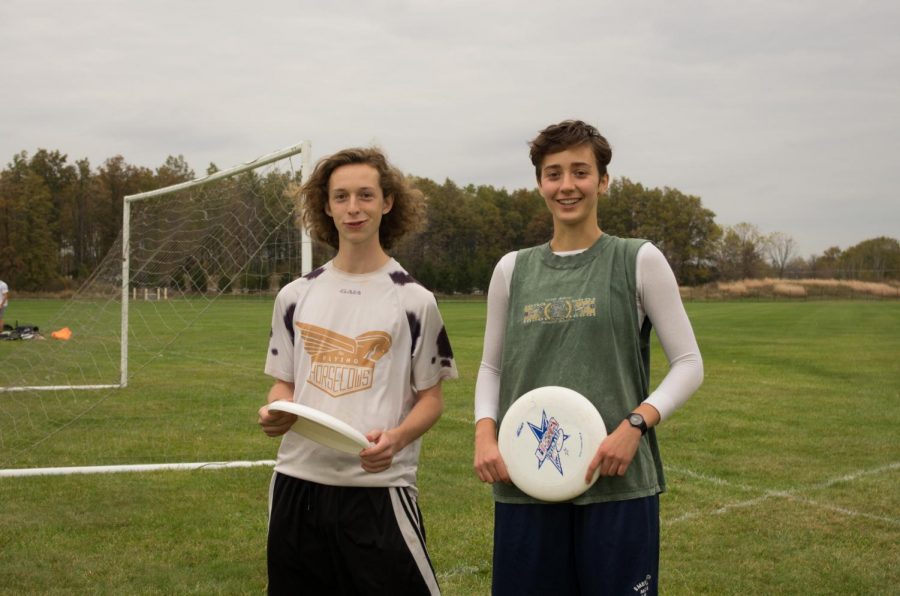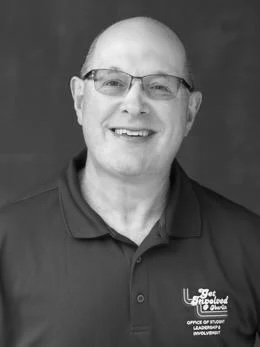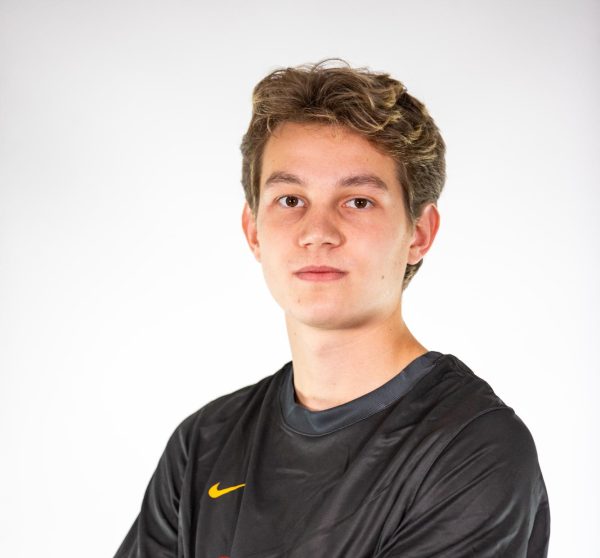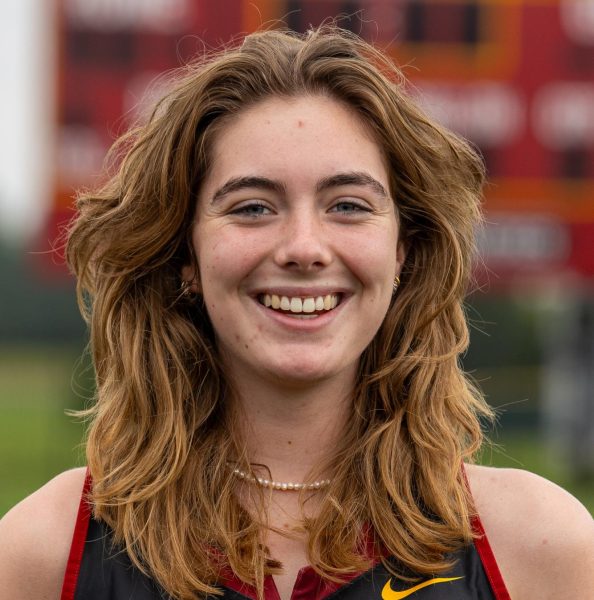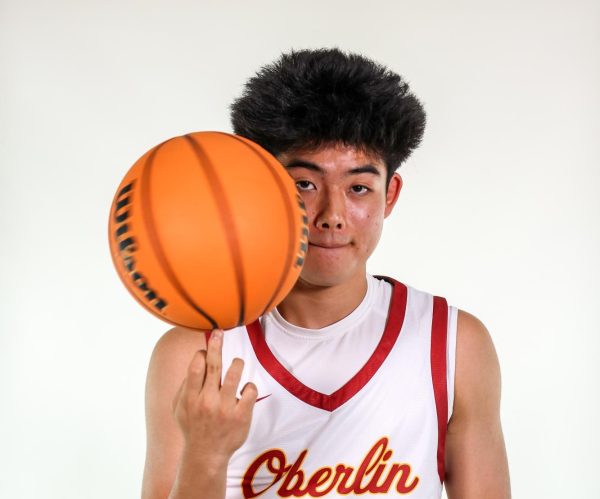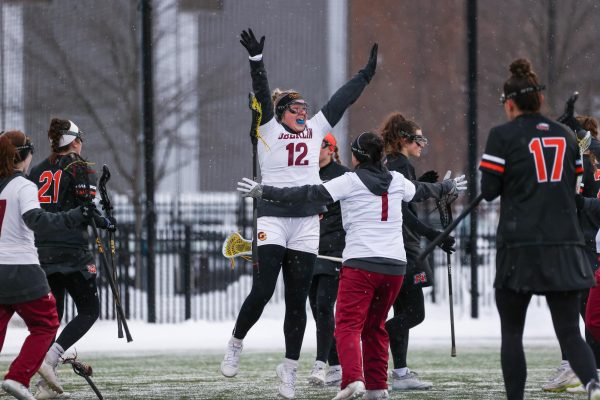In The Locker Room with Noam Fisherman and Emma March, Ultimate Frisbee Captains
Photo by Hugh Newcomb, Photo Editor
Noam Fisherman (left), co-captain of the Flying Horsecows, and Emma March, co-captain of the Preying Manti.
This week, the Review sat down with junior Noam Fisherman and senior Emma March, two captains of the Oberlin Ultimate Frisbee Teams. Fisherman is a co-captain of Oberlin’s men’s team, the Flying Horsecows, while March co-captains the women and trans team, the Preying Manti. The Horsecows and the Manti will host their annual home tournament, Force Freedom, tomorrow and Sunday on the North Fields.
This interview has been edited for length and clarity.
How long have you each been the captains of Oberlin’s frisbee teams?
Emma March: We’ve been captains for just this year. We were both officially elected last spring. Our election process is long and intense; it’s pretty similar to co-op elections but longer.
Noam Fisherman: You first have to get nominated, and then the floor is open for everyone to speak, and eventually there’s a vote after group and individual questioning. The process attempts to really represent what the members of the team are looking for.
Describe the background of Frisbee at Oberlin a little bit. Does the team have a strong history? Do you have any connections to any past players?
EM: Well, one thing we do know is that originally, the Preying Manti started out as the “Oms,” like the wave. Actually, over the past Commencement weekend, we held a Manti/Oms alumni game and the turnout was great. We even played with some people from the original Oberlin Frisbee team, who must’ve been in their 60s. They came with their old shirts and gear and stuff. It was really, really cool to see how big Frisbee was in some people’s lives at Oberlin.
NF: On the men’s team, we actually have this old shirt from the ’70s that circles around the team. It’s like our team’s vintage artifact — it’s cool to like, hold that history.
As the leaders of an entirely student-run sport, how do you foster accountability and commitment within the team?
EM: I think we do this slightly differently on the two teams. It can sometimes be a lot of work to maintain commitment levels, I would say, and it involves a lot of straddling-the-line of being friends with your teammates while also having to lead them and holding a leadership role over them. On our team, I think we always try to hold people accountable by setting a competitive tone at practice. We’ve recently hired two coaches, actually, so when they come to practice it sends the message that like, we’re using their time and our money, and we should try to reap all the benefits of that. We also do take attendance at practice, and that can sometimes affect playing time at tournaments.
NF: I do think that being a leader of a student-run organization is pretty easy for the most part. Because we’re all friends with each other, the actual commitment issue can sometimes be the hardest part. A lot of people do want to play really competitively, but by nature of being a club sport, there are also always gonna be just as many people who aren’t looking for that same competitiveness and want to have more fun. If there ever is a difficult part, it’s usually straddling that line between being competitive and taking ourselves seriously but also making sure people are having fun.
You played at a big tournament over Halloween weekend. How did that go? Were there any specific moments of the tournament you keep looking back on?
EM: The tournament last weekend was honestly a little historic. The governing body of Ultimate Frisbee, USA Ultimate, hosted its first ever officially-sanctioned, mixed tournament this past weekend, meaning it included open teams, as well as women and trans teams. We knew it would be pretty far away — eight hours — in Appleton, WI, but we asked people if they wanted to go beforehand, and we got 16 people from both the Manti and the Horsecows to go together, and it was so much fun. This past weekend was the first time we’ve ever played officially mixed at a tournament, and it was great for so many reasons. We were seeded fifth going in, which means we placed fifth to begin with, but by the end of the tournament we had finished in fourth place. We did have to forfeit the last game to get home early though, but it was so good to play with each other officially and on top of that, to have played really well.
NF: The tournament was organized with bracket play on the second day, and that was when we played in the quarterfinals against the fourth seed team. We just absolutely destroyed them, which was so much fun and so exciting for all of us. I think we all felt really proud of how we played.
Club sports often have to grapple with the difficulty of being a year-round sport, while other sports teams are confined to one season and one offseason. How does the year-round nature of Frisbee affect your team, especially with team members taking time off and studying abroad?
NF: That can definitely be a hard thing to face. Technically, our fall season is more of a “down season,” and our officially sanctioned season is in the spring. We usually only play in three or four tournaments in the fall, so we try to keep it pretty relaxed and fun and wait until the spring to split up into A-B teams. In the spring we definitely ramp it up, but we try to uphold the accountability of team members year round.
EM: The fall tends to be our “rookie season.” It’s when we train all our new people. We have four very good players coming back in the spring from semesters abroad, which is really promising, but I know we’re also losing lots of talented people next semester for the same reason, so the team will definitely see some big gains and big losses. Even though the spring season is the most important season, we end up playing with a slightly different team every semester.
What’s the next big event coming up for the Manti and Horsecows?
NF: We’re hosting our home tournament this weekend. It’s called Force Freedom, and we’ve hosted it in the past. This year we have ten open teams coming — it should be great.
EM: We’ll be splitting into two teams for the tournament because there are 40 of us, so the total number of teams counting our two is 10.
NF: We’ll play four games on Saturday and then three or four on Sunday. We’re playing on North Fields and everyone should come.


